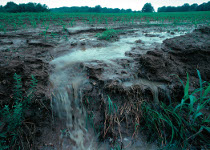Is biofuel worth the cost?
Converting land normally dedicated to growing cereal grains into areas for biofuel production is driving up the price of grains and costing more money than it saves.

 Converting land normally dedicated to growing cereal grains into areas for biofuel production is driving up the price of grains and costing more money than it saves.
Converting land normally dedicated to growing cereal grains into areas for biofuel production is driving up the price of grains and costing more money than it saves.
This evening, Action Aid will host a debate about the use of biofuels and their impact and their efficacy at the London Transport Museum.
Advocates of a biofuel policy hope to eventually develop cellulose-driven biofuels that will no longer necessitate crops high in sugar or starch, such as maize, sugar and palm oil.
So far the profitability of this budding-technology remains unproven. But if technology does become capable of producing affordable biofuels derived from cellulose, this would negate many of the concerns over current biofuel use.
Until then, statistics suggest that global hunger is on the rise and now approaches 1 billion people-a step back from recent trends of hunger reduction in the early 2000's.
Land is being bought in Africa and Latin America in order to stimulate biofuel production and driving out local farmers in order to meet 2020 biofuel targets set in 2008.
The result has been more food shortages. Action Aid projects that an additional 100 million people will go hungry from the developed world's increasing demand for 'green' biofuels.
And the number could increase to 600 million as the decrease in land dedicated to producing cheap staple food is restructured to produce expensive fuel.
The cost of production, transportation and refining has made ethanol-mixed gasoline more expensive than petrol in the United States. Current biofuels do not seem to be the answer to climate change either.
Critics worry that the biofuel industry will lead to further deforestation in order to create additional space for growing biofuels. Over-fertilisation releases harmful chemicals into the environment and effects ecosystems and contributes to water pollution.
All of this would do more to increase the greenhouse effect rather than reduce it. US President Barack Obama re-affirmed the US's investment in biofuels in his State of the Union Address last month.
At present, there are more negative than positive side effects to the current biofuel policy pursued by EU and US officials.
The biofuel debate kicks off at 6:30, is free of charge, and will be followed by a wine reception.
Author: Michael Good | Climate Action
Images Provided by: Lynn Betts | Wikipedia






